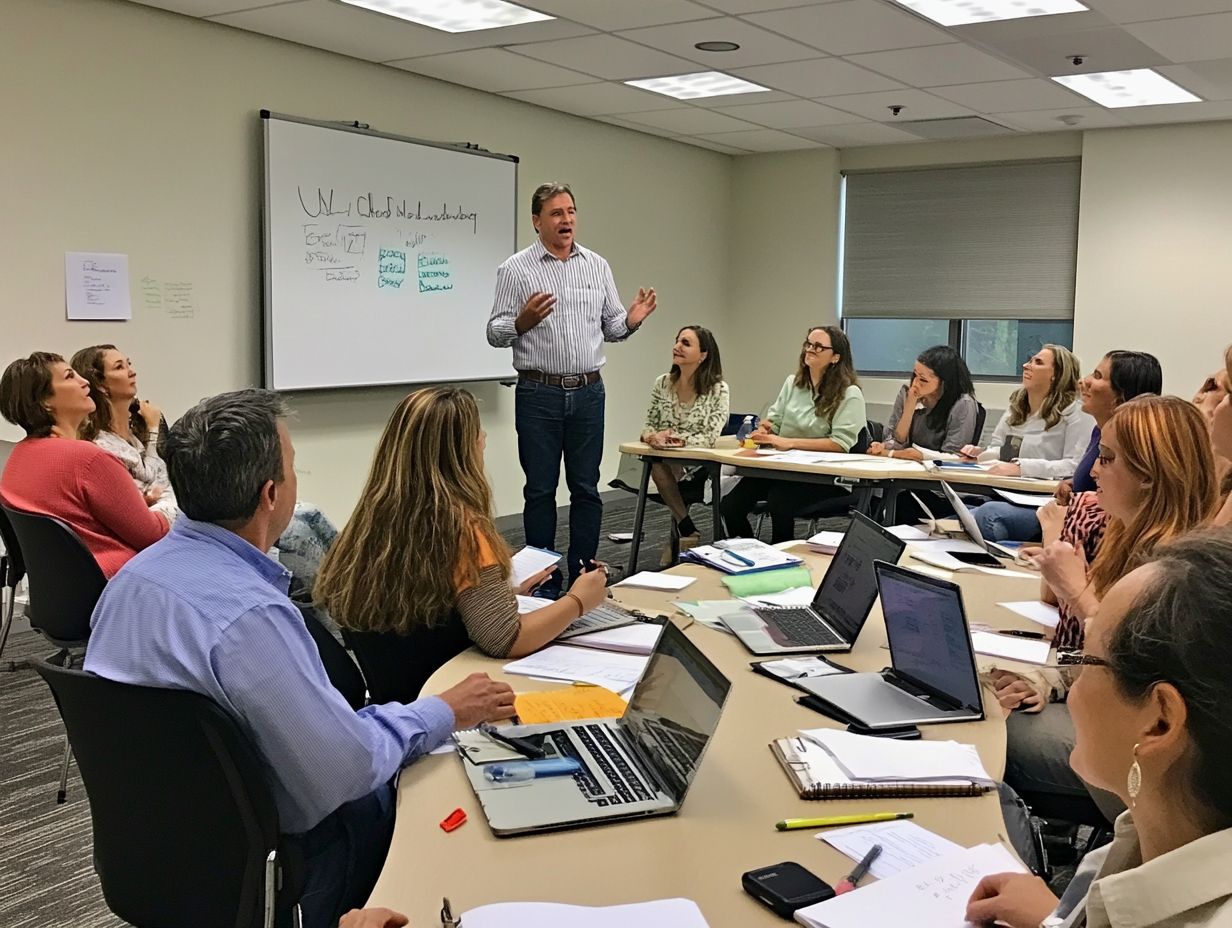The Importance of Leadership Development Programs
In today s fast-paced business world, effective leadership is vital. Leadership Development Programs help grow leaders within organizations, ensuring they have the skills needed for success.
This article invites you to explore what these programs can do for you, showcasing their benefits for both individuals and organizations. It examines various approaches and key components that contribute to their effectiveness. You ll also discover practical steps for implementation and methods to evaluate their impact.
Whether you re aiming to enhance your own leadership skills or develop skills within your team, this guide equips you with insights to navigate the realm of leadership development with confidence.
Contents
- Key Takeaways:
- Understanding Leadership Development Programs
- Benefits of Leadership Development Programs
- Types of Leadership Development Programs
- Key Components of an Effective Program
- Implementing a Leadership Development Program
- Evaluating the Effectiveness of a Program
- Frequently Asked Questions
- What is the purpose of leadership development programs?
- Why are leadership development programs important for organizations?
- What are the benefits of participating in a leadership development program?
- Do leadership development programs only benefit individuals in leadership positions?
- How can organizations measure the success of their leadership development programs?
- Are leadership development programs a one-time event or an ongoing process?
Key Takeaways:

- These programs improve your leadership skills, benefiting both you and your organization.
- They use various approaches to develop leaders with a common goal: building effectiveness.
- Planning and evaluating these programs is key to ensuring their success and making improvements.
Understanding Leadership Development Programs
Leadership Development Programs are meticulously crafted initiatives intended to elevate your leadership skills and unleash your potential within the organization. By participating in these programs, you can significantly boost employee engagement and contribute to the overall success of the organization.
The goal is to cultivate effective leaders like yourself, capable of navigating the complexities of today s business landscape. This, in turn, fosters an innovative culture that enhances retention rates and cultivates a more motivated workforce.
Definition and Purpose
The primary purpose of leadership development programs is to identify and nurture your potential as a leader through a variety of training courses and mentorship opportunities.
These programs are specifically designed to equip you with the essential skills needed for effective leadership, ensuring that you not only become competent but also confident in your abilities. Leadership coaching plays a pivotal role in your journey, offering personalized guidance that hones in on your individual strengths while also addressing specific weaknesses.
Incorporating a mentoring aspect allows you to build relationships where you can learn from seasoned professionals, gaining invaluable insights. Tailored training courses further amplify these benefits, catering to the unique challenges you face within your team and promoting greater employee engagement. This engagement is vital for fostering a culture of sustainable leadership, one that you can actively contribute to and thrive in.
Benefits of Leadership Development Programs
Leadership development programs provide a wealth of benefits that play a crucial role in fostering both individual and organizational success. They are particularly effective in boosting employee retention and enhancing performance management efforts, especially when considering the role of mentorship in leadership development.
Investing in these programs strengthens the foundation of your organization.
Individual and Organizational Advantages
From your perspective, leadership development programs significantly enhance communication skills, elevate workplace morale, and offer invaluable experiences that drive personal growth.
These initiatives not only arm you with essential tools to navigate complex workplace dynamics but also cultivate a growth mindset that fuels your journey of continuous self-improvement. As you refine your ability to collaborate, you become more adaptable, leading to increased job satisfaction and engagement.
Your organization reaps substantial benefits from these programs as well. Enhanced skills translate into improved performance, allowing you to contribute more effectively to team goals. A cohesive culture begins to form as shared learning experiences strengthen bonds among team members, fostering an environment where innovation and collaboration can truly thrive.
Types of Leadership Development Programs

You ll find a diverse array of leadership development programs tailored to meet the unique needs of your organization. These include executive leadership training, training to learn new skills, and workshops to improve skills that focus on specific management techniques.
Each program is crafted to empower you and your team, enhancing your leadership capabilities in a way that aligns with your organizational goals.
Common Approaches and Methods
Common approaches to leadership development include mentorship, coaching, and various tailored training programs that emphasize active leadership and the exploration of diverse leadership styles.
By implementing structured mentorship programs, you can pair emerging leaders with experienced executives for guidance. This facilitates a seamless transfer of knowledge and fosters personalized growth.
Coaching provides one-on-one sessions focused on specific skills or challenges, enhancing your leadership capabilities through customized feedback.
Leadership training workshops can provide immersive experiences think role-playing or scenario analysis that encourage you to practice and refine your decision-making and problem-solving abilities. Each of these methods promotes your personal growth and nurtures a pipeline of capable leaders ready to adapt and thrive in various environments.
Key Components of an Effective Program
An effective leadership development program consists of several essential elements that you should consider. These include clearly defined leadership objectives, a robust performance management system, and an emphasis on developing individual strengths to enhance impact within the organization.
What Makes a Program Successful?
A successful leadership development program is marked by exceptional communication skills training, the nurturing of motivational leaders, and a keen focus on tackling common leadership challenges.
Successful programs thrive on tailored content that fits your organization like a glove, allowing participants to engage meaningfully with relevant scenarios. Ongoing assessments empower leaders to refine their strategic decision-making skills. The integration of real-world case studies provides vivid illustrations of applying what they ve learned.
These elements help individuals recognize and navigate the complexities of leadership, fostering resilience and enhancing their ability to inspire teams. This comprehensive approach addresses both personal and professional growth, equipping you to overcome obstacles in leadership roles with confidence.
Implementing a Leadership Development Program
Implementing a leadership development program demands meticulous planning and execution. Focus on effective strategies that will elevate your program by investing in training courses and nurturing a robust talent pipeline.
This strategy cultivates future leaders and boosts your organization’s overall capabilities.
Steps and Strategies for Implementation

The successful implementation of a leadership development program requires several strategic steps, starting with a comprehensive needs assessment and the establishment of clear evaluation metrics.
To ensure the program resonates with its intended audience, involve key stakeholders from the very beginning. Engaging decision-makers, team leaders, and potential participants fosters a sense of ownership and commitment that significantly enhances the initiative s success.
Maintaining effective communication throughout the process be it through regular updates or sessions designed to gather input solidifies this involvement. Establishing robust feedback loops allows for continuous improvement, enabling you to refine the program based on participant experiences and outcomes.
By incorporating these practical aspects, you ll enhance the overall effectiveness of your strategic decisions, ultimately paving the way for a sustainable and impactful leadership initiative.
Don’t wait start building your leadership pipeline now!
Evaluating the Effectiveness of a Program
Evaluating the effectiveness of a leadership development program is essential for understanding its influence on organizational performance. This assessment highlights the program s impact and reveals opportunities for ongoing improvement, ensuring your leadership initiatives remain impactful and aligned with your organization s goals.
Measuring Impact and Making Improvements
To measure impact, you need a solid approach. This involves assessing outcomes through feedback and performance metrics.
To gauge success, blend surveys and performance reviews. Surveys collect valuable insights from participants and their teams that illuminate shifts in leadership effectiveness. Performance reviews provide quantifiable benchmarks, enabling leaders to evaluate their growth against predefined objectives.
Employing key performance indicators (KPIs) these are measurable values that demonstrate how effectively an organization is achieving its objectives such as employee engagement scores and turnover rates, provides a comprehensive view of organizational health, which refers to the overall effectiveness and well-being of an organization. By systematically collecting and analyzing this data, you can pinpoint strengths and identify areas needing improvement, ultimately refining your development strategies.
Frequently Asked Questions
What is the purpose of leadership development programs?
Leadership development programs are designed to identify and nurture individuals with leadership potential and provide them with the necessary skills and knowledge to excel in leadership roles.
Why are leadership development programs important for organizations?

Effective leadership is crucial for the success of any organization. Leadership development programs ensure that the organization has a strong pipeline of future leaders who can drive growth and innovation.
What are the benefits of participating in a leadership development program?
Participating in a leadership development program can lead to personal and professional growth, improved communication and decision-making skills, increased confidence, and better job performance.
Do leadership development programs only benefit individuals in leadership positions?
No, leadership development programs can benefit individuals at all levels within an organization. They help develop leadership qualities in employees and prepare them for future leadership roles.
How can organizations measure the success of their leadership development programs?
Organizations can measure the success of their leadership development programs by tracking the progress and performance of participants, conducting surveys to gather feedback, and evaluating the program’s impact on the organization’s goals and objectives.
Are leadership development programs a one-time event or an ongoing process?
Think of leadership development as an ongoing journey, not just a one-time event. Continuous learning and development are important for leaders to stay updated and adapt to changing business environments.






